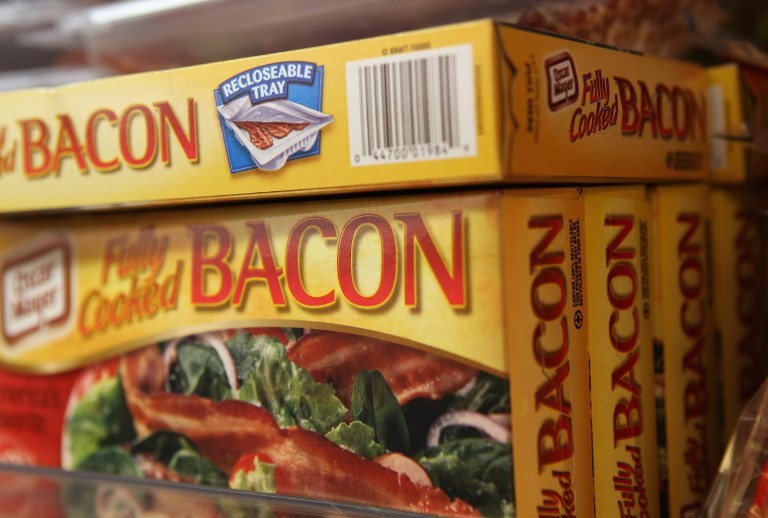China's hitting the US where it hurts: In the pork belly
Change Size
 Packages of bacon are displayed on a shelf at United Market August 17, 2010 in San Rafael, California. (Agence France -Presse/Justin Sullivan/Getty Images)
Packages of bacon are displayed on a shelf at United Market August 17, 2010 in San Rafael, California. (Agence France -Presse/Justin Sullivan/Getty Images)
China struck back at US import tariffs with its own set of reciprocal ones targeting, among other products, pork.
The world’s biggest pork producer, consumer and importer is planning a 25 percent tax on US pork imports, the Ministry of Commerce said in a statement on Friday. The tariffs would be in addition to current duties.
China’s plans for reciprocal tariffs on $3 billion on products from pork to wine come in response to steel and aluminum duties ordered by US President Donald Trump earlier this month. Agricultural commodities could be a feature of any ongoing tit-for-tat trade war. China is already investigating sorghum imports from the US and people familiar with the matter said last month that the country was studying the impact of restrictions on US soybeans, used to feed the Asian country’s pigs.
“China is showing its capacity to fight back,” said Monica Tu, an analyst at Shanghai JC Intelligence. The measures aren’t expected to “impact fundamentals a lot,” she said, as imports from the US only account for about 14 percent of China’s purchases.
Still, China and Hong Kong combined is the second-biggest market for US pork, according to the US Meat Export Federation. Analysts at Vertical Group said this week that US pork was an “easy target” for China, citing a decline in its domestic pork and hog prices.
The National Pork Producers Council warned that possible Chinese tariffs on US pork could have a significant negative impact on rural America. “No one wins in these tit-for-tat trade disputes, least of all the farmers and the consumers,” it said in a statement.
Market Moves
WH Group. the world’s largest pork company, dropped 4.7 percent. The company acquired US pork and hog producer Smithfield Foods in 2013. Shares of Muyuan Foodstuff, the country’s third-biggest pig breeder, rose 0.6 percent. Guangdong Wens Foodstuffs Group, the largest pig breeder, advanced 3.7 percent. New Hope Liuhe, China’s top animal-feed producer, added 0.1 percent. Jiangxi Zhengbang Technology, a feed producer, increased 2 percent.
Soybean meal on Dalian Commodity Exchange climbed as much as 4.3 percent to 3,128 yuan ($494) a metric ton before closing 1.5 percent higher at 3,046 yuan. The surge reflects concerns that an expansion in tariffs could impact the supply of US soybeans to China, according to Tu.
A consolidation of China’s pig industry has seen small farms shut due to environmental concerns, while large-scale operations are expanding. The country’s pork imports are forecast to decline in 2018 as an increase in domestic production reduces the need to buy meat from overseas, according to the U.S. Department of Agriculture.









